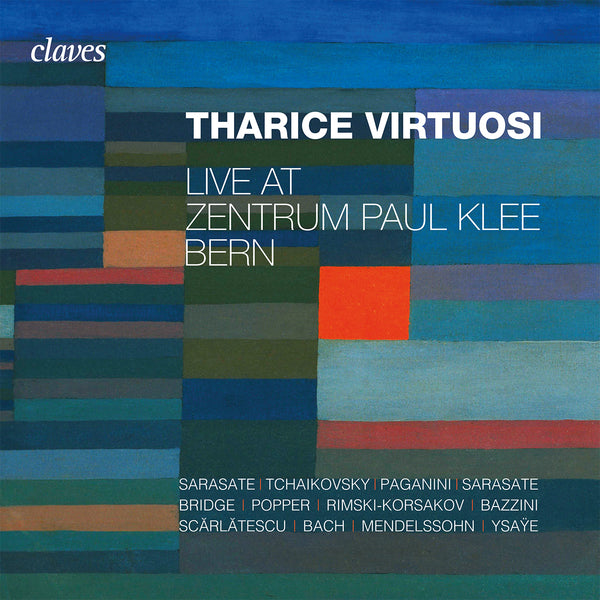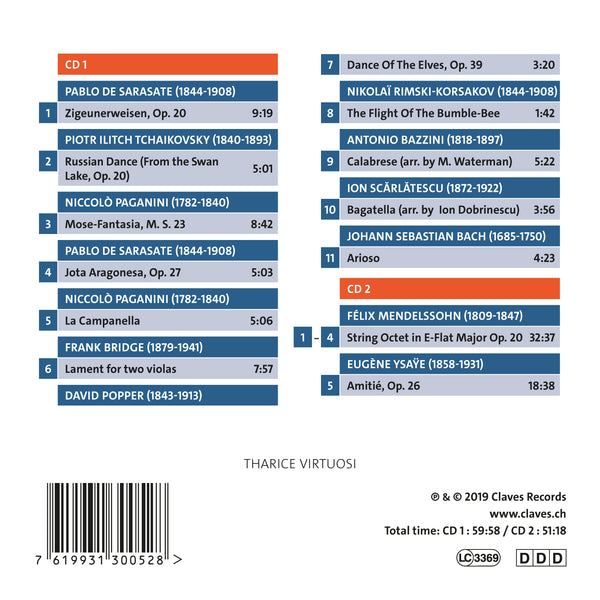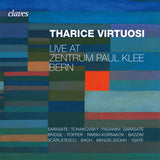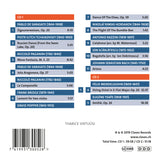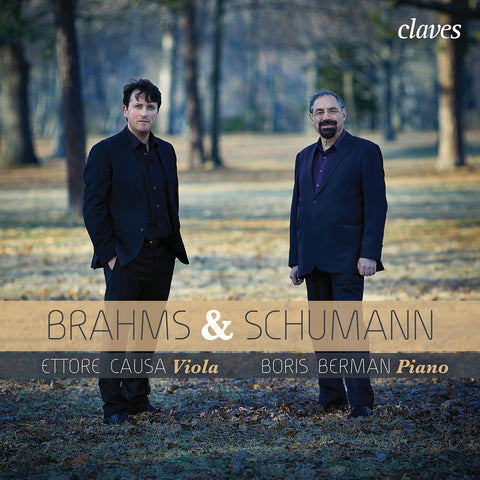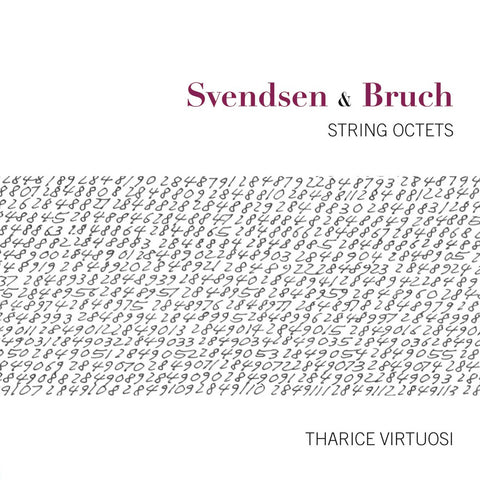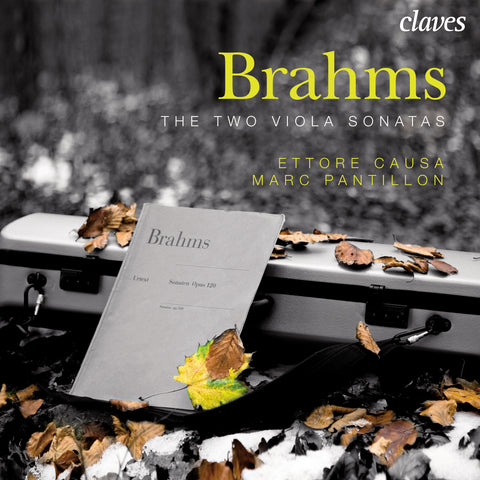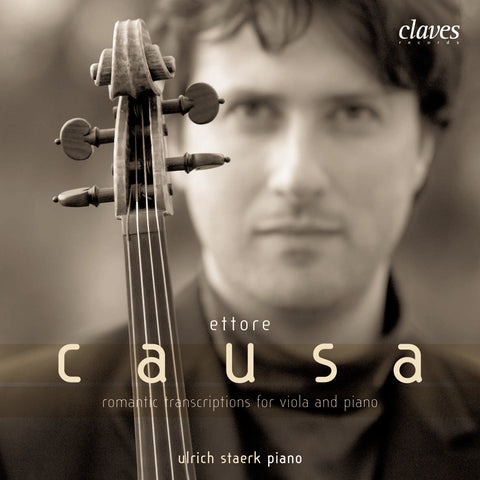(2020) Tharice Virtuosi - Live at Zentrum Paul Klee, Bern
Catégorie(s): Musique de Chambre Répertoire
Instrument(s): Violoncelle Alto Violon
Compositeur principal: Niccolò Paganini
Nb CD(s): 2
N° de catalogue:
CD 3005/06
Sortie: 17.01.2020
EAN/UPC: 7619931300528
Cet album est en repressage. Précommandez-le dès maintenant à un prix spécial.
CHF 24.00
Cet album n'est plus disponible en CD.
Cet album n'est pas encore sorti. Précommandez-le dès maintenant.
CHF 24.00
Cet album n'est plus disponible en CD.
CHF 24.00
TVA incluse pour la Suisse et l'UE
Frais de port offerts
Cet album n'est plus disponible en CD.
TVA incluse pour la Suisse et l'UE
Frais de port offerts
Cet album est en repressage. Précommandez-le dès maintenant à un prix spécial.
CHF 24.00
Cet album n'est plus disponible en CD.
This album has not been released yet.
Pre-order it at a special price now.
CHF 24.00
Cet album n'est plus disponible en CD.
CHF 24.00
Cet album n'est plus disponible en CD.
NOUVEAU: Les achats se font dorénavant dans la devise de votre pays. Modifier le pays ici ou lors du checkout
THARICE VIRTUOSI - LIVE AT ZENTRUM PAUL KLEE, BERN
OF MEAT AND LOLLIPOPS
A time there was when concert programmes comprised a merry medley of music high and low, the short and sweet alongside the longer and the lofty. That changed in the second half of the 19th century, when Richard Wagner and others introduced the concept of the “symphony concert”, usually in three weighty parts, namely an overture, a solo concerto and a symphony. With today’s emphasis on “music communication”, things seem to have gone full circle. More and more major orchestras are offering daytime concerts in which a meaty repertoire piece is placed alongside shorter works of the kind Thomas Beecham used to call “lollipops”. The Tharice Ensemble thrives on such juxtapositions, as is evidenced by the programme recorded here. They also offer many of these smaller works in arrangements of their own. In historical terms, this is a thoroughly “authentic” approach, for it was a common practice until the 20th century began to insist on an often fictitious fidelity to a fixed text.
The earliest piece recorded here, Bach’s “Arioso”, is an ideal place to start our consideration of this meat-and-lollipops programme. Bach used it as both the Sinfonia to his Cantata No. 156 and the slow movement of his Concerto BWV 1056, but these were apparently arrangements of an earlier piece, since lost. So it’s fitting that this piece should have long achieved complete independence, with every new generation making its own arrangements – such as the version for violin solo and strings on this CD.
The “meat” in our present dish is Mendelssohn’s Octet for strings, opus 20. Composed in 1825 when he was just sixteen, it arguably surpasses the achievement of any other musical prodigy, from Wolfgang Mozart to Erich Wolfgang Korngold. But even on its own terms it is one of the pinnacles of Romantic chamber music. Mendelssohn combines formal perfection with an unerring sense of drama (witness the astonishing ascent to the tonic at the end of the exposition of the first movement, about four minutes in). The slow movement is a magnificent hybrid of the angelic and the passionate, the scherzo is his first real essay in the “fairy music” for which he became famous, and the last movement is a perpetuum mobile by a master contrapuntist with a technique far beyond his years.
***
Tharice Virtuosi
Liviu Prunaru, violin
Valentina Svyatlovskaya, violin
Bogdan Zvoristeanu, violin
Oleg Kaskiv, violin
Edgar Pujol, violin
Vlad Stanculeasa, violin
Sophia Reuter, viola
Ettore Causa, viola
Stanimir Todorov, cello
Pablo de Naverán, cello
Daniel Mitnitsky, cello
(2020) Tharice Virtuosi - Live at Zentrum Paul Klee, Bern - CD 3005/06
OF MEAT AND LOLLIPOPS
A time there was when concert programmes comprised a merry medley of music high and low, the short and sweet alongside the longer and the lofty. That changed in the second half of the 19th century, when Richard Wagner and others introduced the concept of the “symphony concert”, usually in three weighty parts, namely an overture, a solo concerto and a symphony. With today’s emphasis on “music communication”, things seem to have gone full circle. More and more major orchestras are offering daytime concerts in which a meaty repertoire piece is placed alongside shorter works of the kind Thomas Beecham used to call “lollipops”. The Tharice Ensemble thrives on such juxtapositions, as is evidenced by the programme recorded here. They also offer many of these smaller works in arrangements of their own. In historical terms, this is a thoroughly “authentic” approach, for it was a common practice until the 20th century began to insist on an often fictitious fidelity to a fixed text.
The earliest piece recorded here, Bach’s “Arioso”, is an ideal place to start our consideration of this meat-and-lollipops programme. Bach used it as both the Sinfonia to his Cantata No. 156 and the slow movement of his Concerto BWV 1056, but these were apparently arrangements of an earlier piece, since lost. So it’s fitting that this piece should have long achieved complete independence, with every new generation making its own arrangements – such as the version for violin solo and strings on this CD.
The “meat” in our present dish is Mendelssohn’s Octet for strings, opus 20. Composed in 1825 when he was just sixteen, it arguably surpasses the achievement of any other musical prodigy, from Wolfgang Mozart to Erich Wolfgang Korngold. But even on its own terms it is one of the pinnacles of Romantic chamber music. Mendelssohn combines formal perfection with an unerring sense of drama (witness the astonishing ascent to the tonic at the end of the exposition of the first movement, about four minutes in). The slow movement is a magnificent hybrid of the angelic and the passionate, the scherzo is his first real essay in the “fairy music” for which he became famous, and the last movement is a perpetuum mobile by a master contrapuntist with a technique far beyond his years.
***
Tharice Virtuosi
Liviu Prunaru, violin
Valentina Svyatlovskaya, violin
Bogdan Zvoristeanu, violin
Oleg Kaskiv, violin
Edgar Pujol, violin
Vlad Stanculeasa, violin
Sophia Reuter, viola
Ettore Causa, viola
Stanimir Todorov, cello
Pablo de Naverán, cello
Daniel Mitnitsky, cello
Return to the album | Read the booklet | Composer(s): Niccolò Paganini | Main Artist: Tharice Virtuosi
STUDIO MASTER (AUDIO HAUTE-RÉSOLUTION)
Amethys Design
David Popper
En stock
Ettore Causa - viola
Eugène Ysaÿe (1858-1931)
Felix Mendelssohn
Frank Bridge
Ion Scărlătescu
Johann Sebastian Bach (1685-1750)
Liviu Prunaru
Musique de chambre
Musique Haute-résolution - Qualité master studio
Niccolò Paganini
Nikolaï Rimski-Korsakov
Oleg Kaskiv - violin
Pablo de Naverán
Pablo de Sarasate
Piotr Ilyich Tchaikovsky (1840-1893)
Répertoire
Tharice Virtuosi
Tous les albums
Violon
Violoncelle
Amethys Design
David Popper
En stock
Ettore Causa - viola
Eugène Ysaÿe (1858-1931)
Felix Mendelssohn
Frank Bridge
Ion Scărlătescu
Johann Sebastian Bach (1685-1750)
Liviu Prunaru
Musique de chambre
Musique Haute-résolution - Qualité master studio
Niccolò Paganini
Nikolaï Rimski-Korsakov
Oleg Kaskiv - violin
Pablo de Naverán
Pablo de Sarasate
Piotr Ilyich Tchaikovsky (1840-1893)
Répertoire
Tharice Virtuosi
Tous les albums
Violon
Violoncelle







